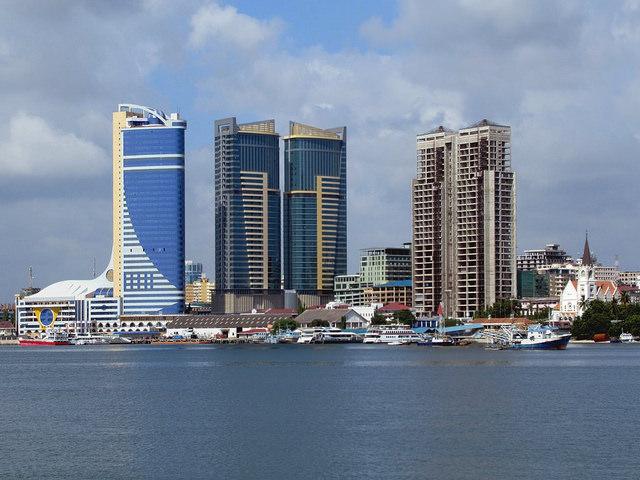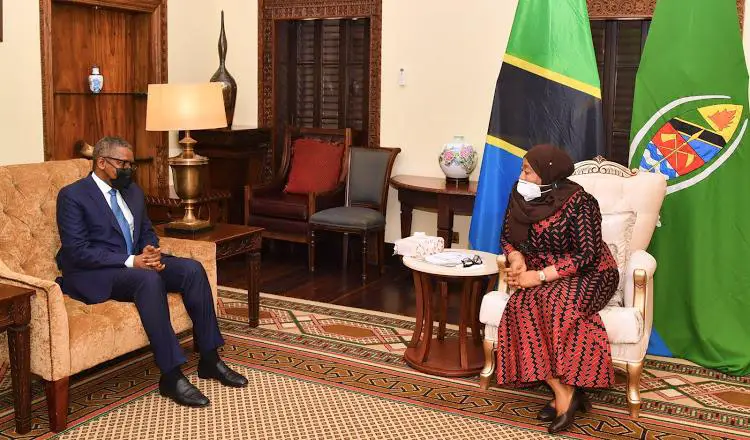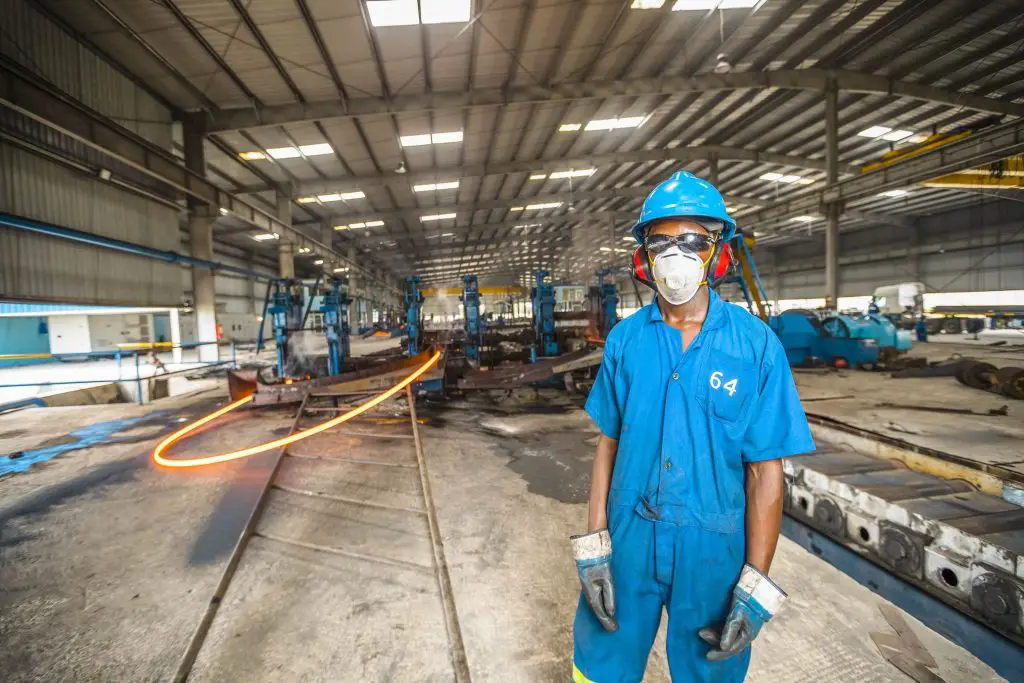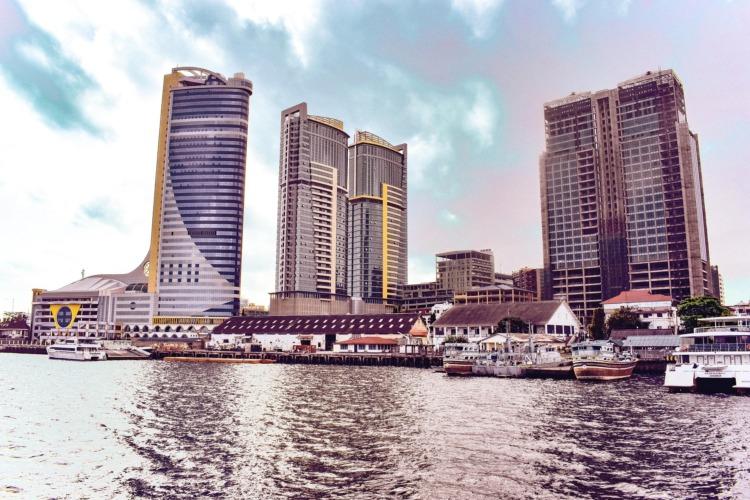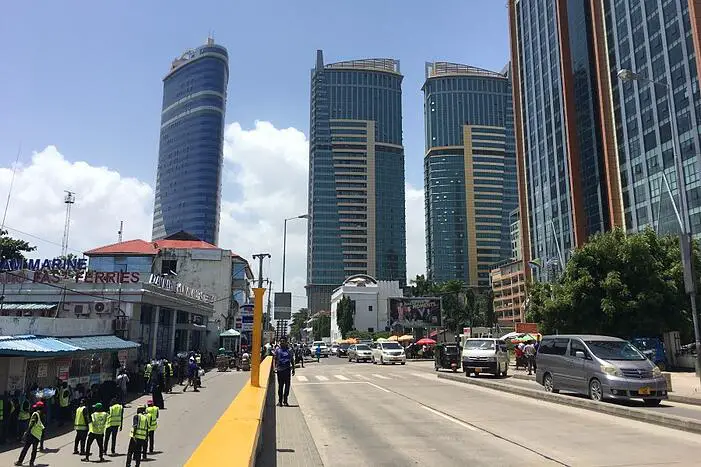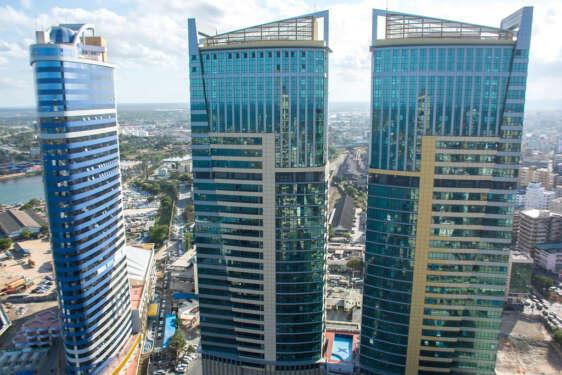- How transition finance can catalyse Africa’s green industrial revolution
- Stanbic PMI Report: Mixed performance as Kenya’s agriculture, construction offset manufacturing decline
- Uganda’s land management gets a tech makeover to boost transparency
- Nigeria’s output dips fastest in 19 months on a sharp rise in costs
- Apple faces growing backlash over Congo exploitation
- Why East Africa is staring at higher wheat prices in 2025
- Nairobi Gate SEZ pumps $7 million into Kenya’s agro-processing industry
- What impact will the US election have on Africa?
Browsing: Tanzania GDP
Further, the IMF argued that the ECF arrangement for Tanzania supports government priorities, strengthening fiscal space for much-needed social spending and high-yield public investment, resuming and advancing the authorities’ structural reform agenda and strengthening financial deepening and stability.
Moreover, the IMF statement noted that “the ECF arrangement is centred on supporting the economic recovery from the scarring effects of Covid-19 and coping with spillovers from the war in Ukraine; preserving macroeconomic stability, and advancing the structural reform agenda toward sustainable and inclusive growth.”
On a broader scale, the IMF’s financial support goes after levitating Tanzania’s essential priorities.…
The government is already working on all issues facing Dangote’s factor on President Suluhu’s directives. This means Tanzania is reshuffling its strategies and operations along the investment lines, to keep up with the rest of the region far ahead of her.
As a country that graduated to a low-middle-income level much more effort towards building sound and attracting an investment environment is required.
The current small achievements prove that there is more coming from President Suluhu’s administration in terms of advancing more foreign investment in the country.…
- China is one of Tanzania’s biggest trade partner
- Tanzania’s industrial economy has been growing over the past decade
- Tanzania has nabbed US$3 billion investment from China company
Investment in Tanzania is changing the labour market and industries in Tanzania for the better.
The government of Tanzania is doubling down on expanding its industrial complex as the new industrial scheme stands to draw around 100,000 direct jobs and 300,000 by 2025 and change Tanzania economy for good.
Tanzania’s industrial economy is slated to expand twelve-fold in the next three years, adding more support to the minor industrial landscape currently operating nationwide, while expanding the list of reasons to invest in Tanzania.
Industries in Tanzania have become a critical component of economic transformation. Tanzania has more than 62,000 small industries which add value to raw materials extracted internally.
READ: Tanzania bagging billions in natural gas investments
According to the Ministry of Investment, …
- The national debt is still a lingering thorn in the economy.
- Central banks point out monetary policy keeps money supply afloat.
- Current GDP is higher than last year’s 4.0 per cent in the same quarter.
Tanzania’s economy is progressing strongly despite global financial shocks propelled by the pandemic.
According to the economic bulletin produced by the central Bank of Tanzania (BoT), the economy grew by 4.3 per cent in the quarter ending September 2021 , which is higher than 4.0 per cent in the corresponding quarter in 2020 – mainly driven by agriculture, transport and storage, trade and repair, manufacturing, mining and quarrying, and construction.
On a comparative basis, Tanzania has stood relatively high compared to the African Development Bank’s optimistic forecast for real GDP growth of 4.1 per cent, contributed by improved performance of the tourism sector and the reopening of trade corridors.
- Gold exports accounted for 43 per cent of goods exported by the year ending September 2021
- The Tanzanian shilling is argued to be stable against the US dollar
- Still, debt is a thorn to the Tanzanian government as it stands at more than $33 billion
The central bank of Tanzania released its monthly economic review report on 11 November, for October 2021, and it depicts the economy to be stabilised, despite a few sectors showing some decline in performance.
One of the most promising notes in the report is the stability of the shilling against the US dollar, “trading at an average rate of Tshs. 2,309.62 per US dollar in September 2021, compared to Tshs. 2,310.88 per US dollar in the preceding month,” the report noted.
Inflation
On this crucial sector of the economy, the report noted that inflation remained within the target of 3.5 per cent for the years …
- Energy, fuel, and utility inflation increased to 5.1 per cent in August 2021 from 3.6 per cent in July 2021
- 12-month inflation remained at 3.8 per cent which is the same rate as the previous month
- Interest rates charged on loans by banks remained unchanged
The Tanzania Central Bank (BoT) released the monthly economic review last week, which breaks down the performance of different economic sectors, of which most portions of the economy portrayed modest performance.
Inflation
The report showed that, in August 2021, twelve-month inflation remained at 3.8 per cent which is the same rate as the previous month, and below the country target of 5 per cent in 2021/2022.
Further, on that line, core inflation which BoT argues, is the index accounts for the largest share in consumer price index (CPI), increased to 4.5 per cent in August 2021 from 4.1 per cent in July 2021—this is attributed …
Tanzania, one of the fast-growing economies across the African continent ascended to a low-middle income country status (LMIC) in 2020, amid COVID-19 pandemic shocks.
The achievements of the East African nation of more than 59 million people have been recognized across the world, with the World Bank (WB) taking note of the country’s success and throwing more than congrats to the table.
Amid uncertainties brought by the pandemic, threatening the livelihood of communities and the sustenance of investments, the central bank of Tanzania forecast the economy to grow by 5.7 per cent in 2021, fueled by public investment and normalization of global trade and investment.
Under the new administration guided by the sixth president, Samia Suluhu Hassan, Tanzania has already set its priorities and highlighted some of the key investment deals on the table, including the $3.5 billion East Africa Crude Oil Pipeline (EACOP) and the Tanzania-Kenya $1 billion gas
The Central Bank of Tanzania (BOT) published the monthly economic review on June 2, 2021, highlighting key economic performance in the country’s different sectors.
Tanzania’s key economic sectors such as exports and imports showed modest performance while inflation remained in tolerable benchmarks.
The East African nation is one of the fastest-growing economies in Africa and it has been on a trajectory to enhance its economy, including advancing to a lower mid-income level, amid uncertainties caused by the global pandemic.
Read: Report Insight: Central bank shows good prospects on Tanzania economy
Various forecasts by different entities including the World Bank (WB) project that Tanzania’s GDP will grow by 4.5 per cent in 2021. However, the global recovery period dictates the fate of its economy.
Inflation
According to the report, headline inflation continues to be within the country and regional benchmarks in May 2021.
“Twelve-month headline inflation remained at 3.3 per cent …
The central bank of Tanzania released the monthly economic review for May 2021 and it has reviewed different sections of the economy with a keen eye.
READ:Tanzania clock’s $3Bn as gold prices soar
Inflation
In this section of the economy, the report showed that, during April 2021, the headline inflation rate remained low and within the country and regional limits.
“Twelve-month headline inflation was 3.3 per cent in April 2021, almost the same as in the preceding month and the corresponding period of 2020,” the report noted.
However, on a month-to-month basis, headline inflation stood at 0.5 per cent, which is a bit higher than the rate registered in the corresponding period of 2020 inflation is projected “to remain within the targeted band for 2020/21”.
Further, the core inflation showed that the index accounts for the largest share in consumer price index (CPI) stood at 3.5 per cent, which …
The central bank of Tanzania (BoT) releases the April 2021 monthly economic review and it depicted the economy to fair rather moderately amid the waves of COVID-19 recovery globally.
At the moment, Tanzania economy is projected to grow by 5.7 per cent this year, propelled by public investment and normalization of global trade and investment, according to BoT.
Inflation
According to the report, inflation remained low and within the benchmarks set forth at both the national regional levels.
“Year-on-year headline inflation eased to 3.2 per cent in March 2021 from 3.3 per cent in the preceding month and 3.4 per cent in the corresponding period in 2020, driven mainly by the slowdown in prices of rentals paid by tenants, gas, charcoal, firewood, and transportation cost,” the central bank report said.
Further on the line, on a month-to-month basis, headline inflation stabilized at 0.9 per cent in March 2021 as in …





